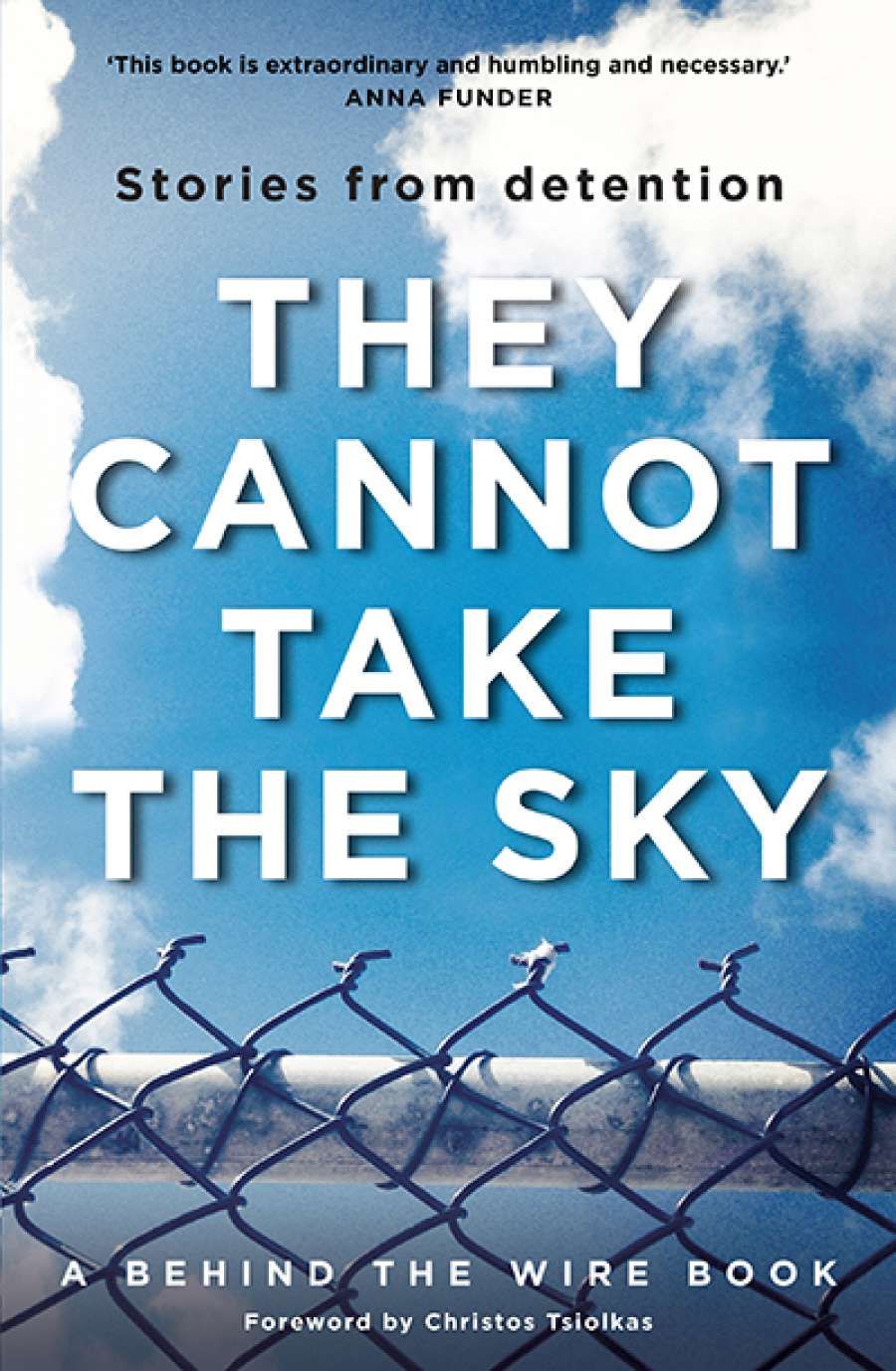
- Free Article: No
- Contents Category: Anthology
- Custom Article Title: Madeline Gleeson reviews 'They Cannot Take The Sky: Stories from detention' edited by Michael Green et al.
- Custom Highlight Text:
Refugee law and policies are subject to vociferous debate the world over as governments and societies grapple with the challenges of almost unprecedented global displacement ...
- Book 1 Title: They Cannot Take The Sky
- Book 1 Subtitle: Stories from detention
- Book 1 Biblio: Allen & Unwin, $29.99 pb, 336 pp, 9781760292805
The book opens with a prologue by Behrouz Boochani: a Kurdish journalist from Iran, detained on Manus Island in Papua New Guinea since 2013, and by now well-known among journalists and the refugee sector in Australia. Boochani is an obvious choice as first author in the collection. He draws the reader in, narrating life inside the detention centre on Manus Island with an unsettling frankness and intensity. Although he begins in direct prose, a rapid descent into madness soon follows, interspersed with sudden moments of startling lucidity. At one point Boochani finds himself up a tree, half naked in the rain, threatening to jump, and demanding cigarettes and Beethoven. In that moment, he realises that he has become ‘a crazy poet’. ‘Yeah’, he writes, ‘I am a poet now ... completely crazy, but philosophical crazy.’ It is a deeply confronting prologue, and sets the tone perfectly for the chapters that follow.
In three parts, They Cannot Take the Sky presents a skilfully curated collection of personal stories from within, and looking back on, detention. The collection is representative of a broad range of experiences. The contributors arrived in Australia at various times since the 1990s. Some came as children, others as adults. They spent time in a range of detention centres across the Australian mainland, on Christmas Island, and in Nauru and Papua New Guinea – some for as little as a few weeks, others for several years (and counting).
Despite this diversity of experience, common themes recur: hopelessness and helplessness within the detention environment, trauma and self-harm, confusion about visa processes, a sense of being stripped of all control over even the most basic aspects of life, frustration at not being understood. The authors who have been released describe the moment they learned of their freedom with mixed emotions – for some joy, others sorrow. But many shared common sentiments after their release, including a sense of guilt and of not belonging, anger, depression, and anxiety. The consistency with which these enduring symptoms are cited, even by people who were detained for relatively short periods, raises the question whether any amount of time in such conditions is acceptable, especially for children.
For some contributors, their homelands and the circumstances that caused them to flee assume a central role in their narratives, while others pass over this time relatively quickly. All share a common horror about the time spent in detention. Their trauma bleeds through the prose, even on reflection years later. A number of contributors write with remarkable candour about their darkest moments, and innermost fears.
Some stories, like Aran’s recollection of the aftermath of a bombing, when he found his brother ‘chopped in half’ and a friend ‘hanging on the tamarind tree, and all his intestines and everything had come out’, are graphic. Perhaps even more powerful are the gaps in the stories: the parts which, even in this most revealing of texts, are too traumatic to articulate. ‘I remember a lot of things vividly that I can’t even describe,’ writes Donna, while Hal-Hal ‘wants you to know that there is so much about her experiences she wasn’t able to talk about, because those things are too painful’.
 Michael Green (photograph by Cameron Ford)
Michael Green (photograph by Cameron Ford)
Greatest credit goes to the contributors themselves, but the book’s editors – Michael Green, André Dao, Angelica Neville, Dana Affleck, and Sienna Merope – also deserve recognition for the care they have taken with the stories entrusted to them. Each story has been deftly crafted to fit within the overall flow of the book, while maintaining and capturing the nuances of each narrator’s voice.
They Cannot Take the Sky is rare and essential reading. Above all, it offers a different perspective – and perhaps the most important perspective – on the impacts of detention and Australia’s broader immigration policies. We learn that five-year-old Jamila, detained at Woomera in 2001, admired the boys who self-harmed in protest against their detention, regarding them as bold, brave, and fearless for standing up for themselves in such hopeless times. We come to understand why something as simple as changing the number of apples available on a given day can drive a person to madness. We see the logic behind the protests, the resistance, the panic, the breakdowns. We share the confusion and frustration with arbitrary processes and unnecessarily harsh policies.
All that is left is to do something about it.


Comments powered by CComment